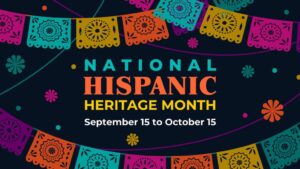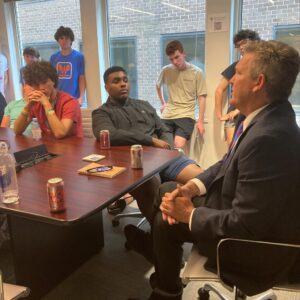Starting off this school year, you might have seen some new changes or features on campus. One of these changes happens to be where many walk by everyday. This is the new location of the Global Inclusion Office. Along with the Campus Ministry and Community Service departments, the Global Inclusion Office’s concentration is best described by Ms. Stewart below.
“Starting this year, these three offices are united under the Office of Mission, and working together to facilitate students putting their faith into action in service of our community.” – Ms. Elise Stewart, Director of Mission & Formation
Currently, the Global Inclusion team consists of Mr. Jose Aquino, Mr. Claudio Eduardo Pinto, and Mr. Koob Yohannes. Recently, I had the opportunity to interview these three teachers for their insight into their team’s functions and future plans.
Mr. Aquino
Who first suggested the idea of having an office for the Global Inclusion team? What are its main functions?
The Global Inclusion Office was not a new initiative. It’s always been woven into part of the Jesuit community for the past 25 years. Seeing how the world is evolving, we thought that having a Global Inclusion Office was a necessity. The idea behind global inclusion is that we are global citizens and every person should take responsibility for that. We should all be responsible for each other in our inclusive society. Regarding function, the office has a variety of functions. One of the most important things is student support. The office seeks to support students and faculty and staff as well.

With this year’s theme being open to growth, what would be your main advice to students?
I would advise students to be open to everything. I have been working a lot with the team to figure out what it is we want from the community. We want to be inclusive to everybody. But we know that it is difficult to try and fit everything in and celebrate everything. If we could pick certain things, that would be great.
For example, between September 15 and October 15, we celebrate National Hispanic Heritage Month. So, we ask what we could do for Hispanic students during holidays like Dia de los Muertos, which we have done for years. We’re also trying to do something similar to a prayer service, but more like a community discussion where we talk about a certain topic in a respectful environment. Regarding respect, this is one of the main focus points I’ve been discussing with the team by finding out ways to get students engaged in discussions in a safe and constructive environment.

These days, it seems that many people have forgotten the art of discussion and how to learn from each other by having a conversation. Personally, I think that the purpose of being open to growth is for people to learn from each other, even if we might disagree. The main attitude should be an enthusiasm for learning. By being open to growth, we are exposed to new ideas and thoughts. In these situations, I hope that we can find empathy by better understanding others’ opinions that we might not necessarily agree with.
Mr. Yohannes
What was your reaction like when you heard a Global Inclusion team was forming?
A version of the Global Inclusion Office had already existed before this year. There were many faculty members who worked towards the goal of diversity and inclusion in the past few years. Mr. Aquino, Mr. Eduardo Pinto, and I are not the first people who kind of started the office. Rather we are just the people who were added to that cause. The main idea is that one must recognize that this is not the responsibility of one individual, but the responsibility of the community to ensure that its members are united in love and respect for one another.

How do you perceive the Global Inclusion team as an advocate of justice?
I think Jesuit Dallas is all about being an advocate for justice. It’s the main idea of being Men and Women for and with Others. Often, we might throw the terms of social justice and diversity around and feel satisfied with our current situation. For example, I do not have to tell you my beliefs because you should be able to see my beliefs by my actions. So if we are talking about being Men and Women for and with Others, how are we treating and loving those who do not fit in our normative pattern? What is it like to be a Jesuit student and member of the community?
In social studies classes, we study how there could be various marginalized communities throughout time. We must recognize the following: are we any different in treating those communities, or do we fall on the same pattern of repeating the same past mistakes (e.g. concern for oneself at the expense of others)?

So, the idea of social justice is highly connected to what we examine in social studies. We recognize that these are problems that societies always had. In addition, we ask students how we can go about bringing change to our society. First, we ask students how they are treating each other, how are we faculty interacting with students, and what are the families doing in the midst of these social issues.
If we want to be advocates for justice, we must take action. If it’s all theoretical, then it’s plain lip service. People will see this and conclude that there is no actual substance that we may believe or think about. Therefore, action is necessary.
Mr. Eduardo Pinto
How do you think that the Global Inclusion team can assist in the Jesuit student formation as well as community life?
The main idea of the Global Inclusion Office is to see to and care for the needs of the Jesuit community. Specifically, it’s mainly about being a source of student support. Our goal is to help students understand that while we all experience the world differently, there’s power in honoring our shared humanity. Solidarity is our only path to a better world where everyone is given dignity and security. Jesuit Dallas is the perfect place to build these critical skills.

As a member of the Global Inclusion team, what advice would you give to Jesuit students and faculty, especially with this year’s theme being open to growth?
Whenever we think about being open to growth, we think that there’s always room for improvement. We are all human beings in a world where we are learning everyday. It’s beneficial that we have a community where we collaborate and gain new knowledge. Moreover, there is a huge correlation about when we are learning in academics, faith, or sports. I think that these components create the idea of a global citizen.
The goal of the Global Inclusion Office is to put all of these components together so that we can function as a support to students as they are learning.
What are the team’s goals in the coming year?
This is our first year and we are trying to create new initiatives. Currently, taking the academic calendar into consideration, we are mindful of the initiatives we are trying to launch. For example, we are planning to be more involved with the students themselves. We would like to give some talks to the students about some components about our office and our associations with campus ministry and community service departments. The coming weeks provide us an opportunity to make decisions on these new initiatives. But we are still in the process of exploring all of our options and alternatives.
The Global Inclusion Office is an integral part of the Jesuit community. Even though it might be overlooked or small, the office serves as an incredible resource for all students, faculty, and staff. If you need help or just want to chat to the office’s faculty, it is always open from morning to afternoon!
Stay tuned to The Roundup for more community news and profiles!
